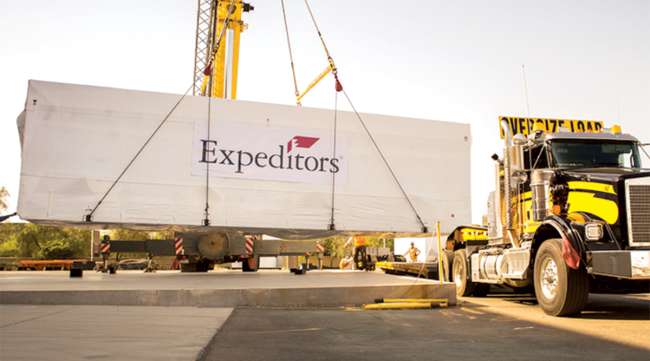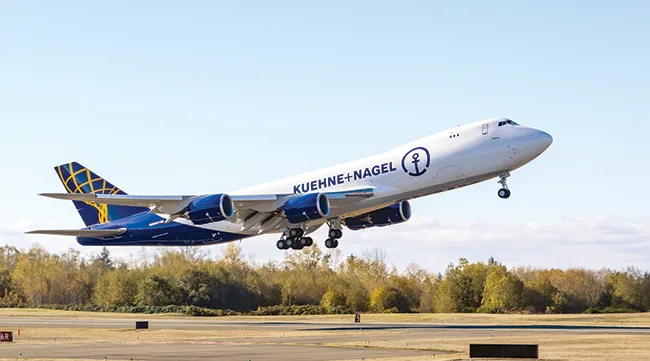Features Coordinator
Sector Rankings Reflect Shifting Freight Market

[Stay on top of transportation news: Get TTNews in your inbox.]
Freight Brokerage Firms
Even as freight demand cooled last year, many of the largest freight brokerage companies in North America continued to expand their businesses.
A majority of the industry’s top freight brokers were able to increase their gross and net revenue results in 2022, though typically at a slower rate than in 2021.
C.H. Robinson Worldwide remained North America’s largest freight broker by a wide margin with $15.8 billion in gross revenue from its brokerage operations, up from $14.5 billion a year earlier.
The rest of the top three also is unchanged from a year ago, with Total Quality Logistics checking in at No. 2 with brokerage revenue of $8.7 billion, followed by UPS Inc. subsidiary Coyote Logistics at No. 3 with an estimated $5.2 billion.
Worldwide Express/GlobalTranz, with revenue of $4.9 billion, ranks No. 4 on the sector list.
►2023 List Highlights Growth for 3PLs
►How 3PLs Are Building More Collaborative Supply Chains
►Map: Where the Top 100 Are
►Armstrong: A Year of Transition for 3PLs
►Shipment Visibility Is About Operational Excellence
►Sector Rankings Reflect Shifting Freight Market
Sector Rankings
Freight Brokerage | Dedicated
Dry Storage Warehousing
Refrigerated Warehousing
Ocean Freight | Airfreight
Landstar System, which operates via a network of independent freight brokerage agents, also moves into the top 5.
Another company that jumped up the rankings this year is Ascent Global Logistics, which climbed to No. 13 with $2.1 billion in freight brokerage gross revenue, up from No. 19 a year earlier.
A new name on the list this year is RXO, which debuts at No. 8. The Charlotte, N.C.-based firm became an independent freight brokerage company after completing its spinoff from less-than-truckload carrier XPO in November 2022.
— Seth Clevenger
Dry Storage Warehousing Firms
The warehousing segment of the third-party logistics industry enjoyed significant growth in 2022 as the supply chain disruptions inflicted by the coronavirus pandemic continued to ease and many customers rebuilt their depleted inventories.
The demand for e-commerce fulfillment, which spiked during the pandemic, has remained strong even with the worst of the pandemic in the rearview mirror.
At the same time, however, warehouse operators have been contending with increasingly acute labor shortages, much like many other segments of the economy.
Given those labor challenges, providers of warehousing and fulfillment services are increasingly investing in innovation and technologies, such as warehouse automation and robotics, to enhance worker efficiency, increase throughput and keep pace with consumer demand for speedy delivery of products ordered online.
DHL Supply Chain North America retained its position as the largest provider of dry storage warehousing services in North America. The company grew its total storage capacity by more than 10 million square feet and by adding 27 warehouses last year.
Ryder Supply Chain Solutions, meanwhile, became North America’s second-largest dry storage warehouse operator after expanding its capacity by 15 million square feet.

A Ryder employee operates a forklift inside one of the company's warehouses. (Ryder)
Ryder’s rise meant a drop in rank for GXO, which debuted at No. 2 last year after its spinoff from XPO Logistics, but checks in at No. 3 for 2022.
Rounding out the top five are New Jersey-based NFI and the Tennessee-based North American operations of Geodis.
In total, 84 companies reported at least 2 million square feet of storage capacity, up from 73 last year.
Refrigerated Warehousing Firms
The biggest player in the world of temperature-controlled warehousing, Lineage Logistics, expanded its industry lead in 2022.
An increase of refrigerated storage capacity of 300 million cubic feet and the addition of 30 new warehouses marked another year of growth and strengthened Lineage’s position atop the list of North America’s largest cold storage providers.
Lineage plans to continue expanding its reach in North America and across the globe. In December 2022, the company announced it had raised more than $700 million in new funding for development projects.
Americold Logistics remains No. 2 on the sector list by a wide margin, although the company’s refrigerated storage capacity and warehouse count contracted in 2022.
Three other North American companies operate more than 25 million cubic feet of cold storage capacity: Penske Logistics, Burris Logistics and RLS Logistics.

A Penske worker moves a pallet across the warehouse floor. (Penske Logistics)
Dedicated Contract Carriers
Most of North America’s largest dedicated contract carriers expanded the size of their fleets in 2022.
J.B. Hunt Dedicated Contract Services remained No. 1 on the dedicated carrier sector list with nearly 13,000 trucks in its dedicated operations, an increase of more than 1,000 from a year ago.
Penske Logistics held onto the No. 2 ranking with a dedicated fleet of 8,969 power units.
Ryder Supply Chain Solutions also expanded its dedicated fleet operations. The company’s 8,930 dedicated trucks rank No. 3 on the list.
Schneider, meanwhile, rose to No. 4 in the dedicated contract carrier sector, up from No. 7 a year ago, after growing its dedicated fleet to 5,915 trucks.
No. 5 Werner Logistics and No. 6 NFI also bolstered their dedicated operations in 2022, expanding their fleet sizes to 5,450 and 5,000 power units, respectively.
They were followed closely by Knight-Swift Transportation with its dedicated fleet of 4,857 trucks.
Airfreight Forwarders
Airfreight demand cooled last year, contributing to declining volumes among many of the largest players in the airfreight forwarding sector.
Nonetheless, Kuehne + Nagel was able to continue its growth trajectory in 2022, forwarding 12,000 more metric tons of air cargo than the previous year, keeping it firmly in the No. 1 spot on the list.

A Kuehne + Nagel aircraft takes off. (Kuehne + Nagel)
No. 2 DHL Supply Chain & Global Forwarding, No. 3 DSV A/S and No. 4 DB Schenker all experienced slight declines in airfreight volumes in 2022 but maintained strong figures overall to continue their placements in the top four.
Meanwhile, Sinotrans Ltd. climbed to No. 8 on the sector list, up from No. 11 last year, after forwarding 781,000 metric tons of airfreight in 2021, a significant increase from its previous-year total of 532,300 metric tons.
Ocean Freight Forwarders
Forwarders of ocean freight had a bumpy ride in 2022 as ocean shipping rates dropped from their pandemic-driven highs and supply chain bottlenecks eased in the second half of the year.
Kuehne + Nagel maintained its No. 1 position in the ocean freight forwarding sector even as its volume fell to 4.39 million 20-foot-equivalent units, a decline of more than 200,000 TEUs from the previous year.
Chinese firm Sinotrans Ltd., in contrast, expanded its ocean forwarding business to 3.89 million TEUs last year, placing it at No. 2 on the sector list.
No. 3 DHL Supply Chain & Global Forwarding was next on the list with 3.29 million TEUs, followed by DSV A/S and DB Schenker rounding out the top five.
The remaining companies in the top 10 all reported forwarding more than 1 million TEUs of ocean freight in 2022, including No. 8 Ceva Logistics and No. 10 Geodis, both of which saw volume increases.
A total of 47 companies forwarded at least 100,000 TEUs of ocean freight in 2022.
Want more news? Listen to today's daily briefing below or go here for more info:





